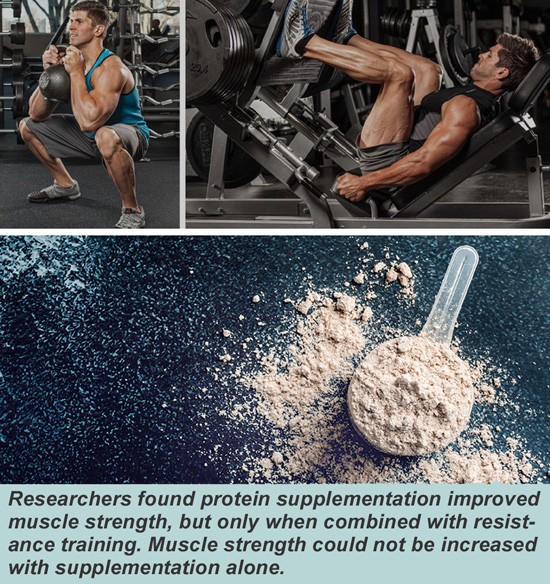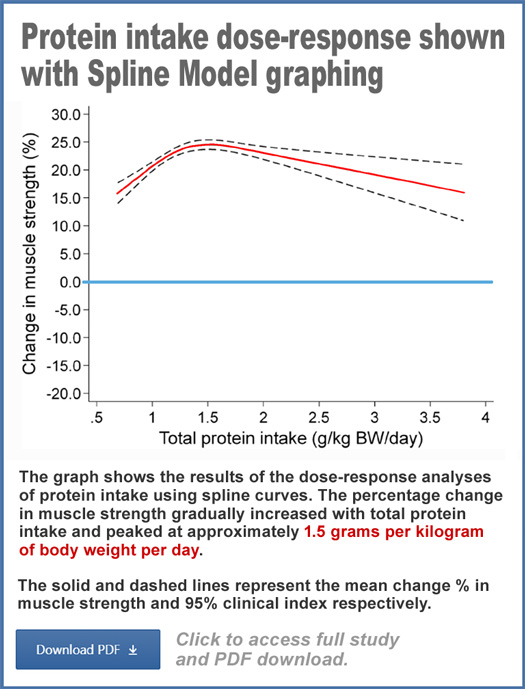Unless you’ve been asleep for the past few years you know there’s a robust debate about whether a high protein diet is beneficial and effective or whether it’s detrimental to health.
There are primarily two groups of advocates for high protein dieting. The first group are athletes prioritizing muscle building, and the second group are proponents of high protein intake to support weight loss—Atkins, Zone, Caveman, Paleo, to name a few.
Though some advocates say these diets are a healthy lifestyle option for anyone, the fact is most people embark on them to lose weight.
Whatever the reason, this may be the year to change your thinking thanks to a new study. The study solidified two points. First, protein supplementing only works when coupled with exercise; secondly, the upper limit for protein intake is not as high as most people believe.
The findings don’t change the fact that protein is still a critical nutrient and should be a major focus of health—but there is a limit and it needs to be balanced with other macro-nutrients. To quote one of the researchers: “We now know the exact amounts of protein needed to build the most muscle, and we know that excess causes problems.”
Study findings
The meta-analysis study was conducted by researchers from Waseda University in Tokyo and from the Japanese food company Meiji.
The researchers found that protein supplementation improved muscle strength when combined with resistance training, irrespective of age, sex, baseline protein intake, added protein intake, or body part. At the same time researchers reported muscle strength could not be increased by protein supplementation alone—it only happened in conjunction with resistance training.
The research, published in Sports Medicine-Open in September 2022, was purported to be the first time that a dose-response was found between protein intake and muscle strength.
The researchers wrote that previous studies had clarified the detailed relationship between muscle mass and protein intake, but in this study the researchers want to focus on muscle strength—the force exerted by muscles.
And with this focus, researchers assert they pinpointed the peak ratio: “Muscle strength with resistance training increased by 0.72 percent per 0.1 grams per kilogram of body weight per day increase in protein intake up to 1.5 grams per kilogram of body weight per day.”
After this peak no further gains were noted by the researchers.
Study methodology
To conduct the study researchers found 82 research papers archived at PubMed.gov and the Japanese database Ichushi-Web.
PubMed.gov is a U.S.-based scientific database funded by the National Institutes of Health, while Ichushi-Web is a similar, but smaller online academic Japanese-language article repository.
The papers included randomized controlled trials investigating the effects of protein intake on muscle strength. With the findings, the researchers created a forest plot to find out the effects of protein intake on muscle strength percentage changes.
They also created spline models to examine the correlation between total protein intake and muscle strength percentage changes from baseline.
Health risks for both deficient intake and excessive intake
Though the study focus was muscle strength, the researchers took the time to discuss both the importance of adequate protein intake and the health risks of excess intake.
The researchers noted that muscle strength is such an integral part of overall health that muscle maintenance is recommended not only for individuals with active lifestyles, such as athletes, but also for those with normal physical activity.
“In addition to its correlation with good physical abilities such as high balance skills, low fall risk, and excellent athletic performance, high muscle strength is also known as an important indicator of physical fitness associated with high bone density; lung function; and low risk of depressive disorder, diabetes mellitus, and death,” the researchers wrote, citing numerous supporting studies.
But as important as it is to consume enough protein, the researchers cautioned that it is equally important not to consume excessive protein.
“It is important, especially for the above at-risk population, to consume a moderate amount of protein to maintain nitrogen balance and avoid the risks associated with excessive protein intake,” the researchers wrote in the study conclusions.
“Particularly, high protein intake from animal sources other than milk is associated with lower renal function in individuals with mild renal impairment.”
– – –
Protein-providing products from Optimal Health Systems include:
• Optimal Complete Nutrition Plus
• Optimal Collagen Plus
• Optimal Complete Performance-Vanilla
• Optimal Complete Performance-Chocolate
– – –
Article Sources: Sports Medicine-Open (Springer Open database), NutraIngredients-Asia.com, Waseda University.



